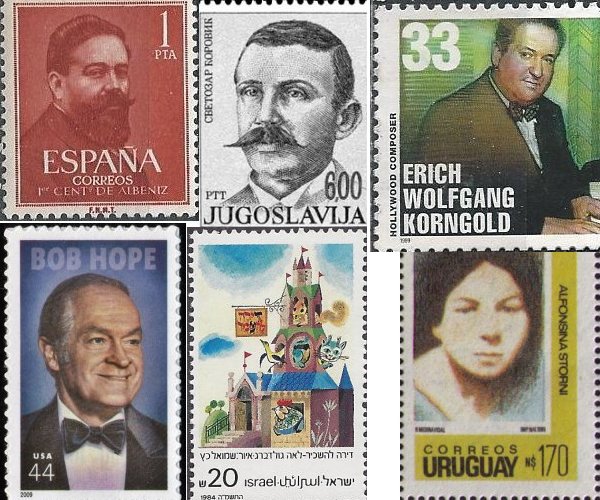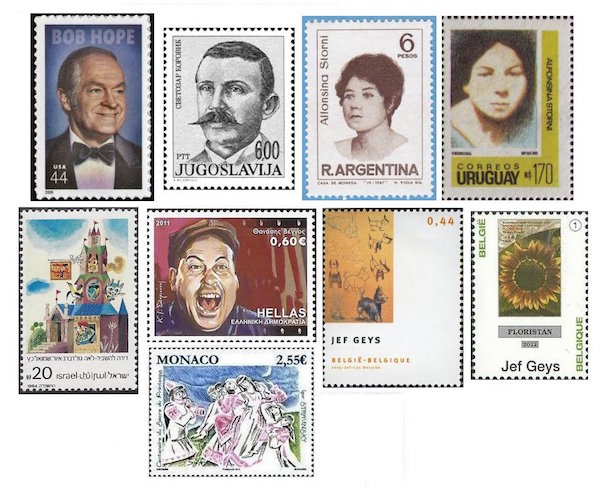The Arts on the Stamps of the World — May 29
An Arts Fuse regular feature: the arts on stamps of the world.

By Doug Briscoe
I thought we’d lead off today with Terence Hanbury “Tim” White (29 May 1906 – 17 January 1964), better known to you and me as T.H. White, author of the beloved Arthurian novels collected together as The Once and Future King (1958). Born in Bombay, White attended Queens’ College, Cambridge, where he wrote a thesis on—surprise!—Thomas Malory’s Le Morte d’Arthur. He wrote a pair of science fiction novels in 1934-5 and a memoir, England Have My Bones, in 1936. 1938 saw the first volume of his Arthurian novels, The Sword in the Stone. Of White’s personal beliefs and solitary life his biographer Sylvia Townsend Warner, in a poignant phrase, wrote: “Notably free from fearing God, he was basically afraid of the human race.” T.H. White died on a ship that was taking him home to Alderney. On the one hundredth anniversary of his birth, Alderney issued this minisheet of six stamps recalling characters from The Once and Future King.
Spaniard Isaac Albéniz (29 May 1860 – 18 May 1909) began touring as a concert pianist when he was nine. As his father was a customs agent whose job required him to travel often, young Albéniz concertized in both the Old World and the New. His many piano works have often been transcribed for guitar, though to the best of my knowledge he never wrote any music directly for that instrument. He also wrote works on a larger scale: four completed operas, five zarzuelas (three of them now lost), an oratorio, Cristo, and a piano concerto (a second concerto was left unfinished). He suffered from Bright’s disease from 1900 and died of kidney failure at age 48.

The precocious genius of Austro-Hungarian-born American composer Erich Wolfgang Korngold (1897 – November 29, 1957) was recognized by Mahler and Richard Strauss. In childhood he wrote thoroughly accomplished scores and went on to Hollywood to establish himself as one of the foremost film score composers. When he won an Oscar for The Adventures of Robin Hood in 1938, it was the first time the award was given to the composer rather than to the head of the studio music department. (This had happened with the score for Anthony Adverse, composed by Korngold in 1936.) Later he was nominated for The Private Lives of Elizabeth and Essex (1939) and The Sea Hawk (1940). After 1946, Korngold gave up writing original film scores and devoted himself to music for the concert hall. One of the two Korngold stamps shown below honors him for his opera Die tote Stadt, which became an international success in 1920, when the composer was 23.
Bob Hope, you may recall, lived to be a hundred. Born Leslie Towne(s) Hope in Kent, England, on May 29, 1903, he died on July 27, 2003. He was eight when the family came to the United States. In later years he was a notorious womanizer. As a young model in the 60s, my sister knew Mr. Hope reasonably well, because her roommate was, uh, well, let’s just leave it there.
Only the day before yesterday we learned (maybe you knew it already) that the Bosnian Serb poet Aleksa Šantić had been an editor the magazine Zora (Dawn). Well, the Herzegovinian Serb novelist Svetozar Ćorović (29 May 1875 – 17 April 1919) was the founder of that periodical and edited its first three issues. He was a political journalist and wrote poems, stories, and novels before his first play, the patriotically inspired Zulumćar (The Despot, 1912). When World War I erupted he was arrested and sent to a POW camp where because of his journalistic outspokenness he was singled out for abusive treatment and contracted tuberculosis. He was released in 1917 but was dead within two years. His brother Vladimir (1885–1941), an acclaimed historian, was killed in a plane crash while fleeing fascism in the next war.
Another short-lived writer was Alfonsina Storni (May 29, 1892 – October 25, 1938), one of the most important Latin-American poets of the early 20th century. She was born in Switzerland to Italian-Swiss parents and went to Argentina, where her father owned a brewery, in 1896. At fifteen she acted briefly with an itinerant theater company, doing Ibsen and Pérez Galdós. Later she became a journalist in Buenos Aires and began publishing her poetry in 1916, eventually earning two prizes for her 1920 collection Languidez (Languidness). Her writing became more feminist, realist, and erotic; but emotionally disturbed and afflicted with breast cancer, she committed suicide by drowning at the age of 46. She also wrote some stories and at least two novels.

Lithuanian-born Israeli poet Leah Goldberg (May 29, 1911 – January 15, 1970) is also held in very high esteem as a writer of what is now regarded as classic Israeli literature. Her parents were multilingual, as was Leah herself, but did not know Hebrew, which she learned at an early age and to which language she firmly committed herself while still a child in years. Her remarkable command of German, Russian, Lithuanian, Italian, French, and English enabled her to produce many translations into Modern Hebrew, including Mann, Shakespeare, Petrarch, and one of War and Peace. In addition to work of this nature and her poetry, plays, and at least two novels, Goldberg wrote much children’s literature. One of these books, Apartment to Let (Dirah Leaskir, 1959), is the subject of a 1984 Israeli stamp, one of three celebrating works for children. Goldberg settled in Tel Aviv in 1935. She never married. A heavy smoker, she succumbed to lung cancer at the age of 58.
One of the most popular comedy actors of Greece was Thanasis Veggos (29 May 1926 – 3 May 2011), who appeared in well over a hundred movies in the 1950s-70s. One of his later roles was in Theo Angelopoulos Ulysses’ Gaze (1995) opposite Harvey Keitel. A commonly heard phrase in Greek, “runs like Veggos,” is a reference to his slapstick athleticism—he always performed his own stunts.
Belgian artist Jef Geys (born 29 May 1934) has expressed his art in many ways: photography, painting, sculpture, films, installation art, etc., usually with an emphasis on sociopolitical matters. I’ve been unable to identify by title the Geys piece on the 2005 Belgian stamp; the one from 2012 is of his Floristan seedbag.
When Stravinsky’s great ballet The Rite of Spring was first heard at the Théâtre des Champs-Élysées on this date 104 years ago a near-riot ensued. Some witnesses reported that the disturbance was caused more by Nijinsky’s pointedly ungainly choreography than by Stravinsky’s music. In any case, after some of the more obstreperous audience members were ejected, the ballet was presented in full and in relative peace. The centenary was marked four years ago with this stamp from Monaco.
Today is the birthday of at least four important figures deserving of stamps but so far denied them: G. K. Chesterton (29 May 1874 – 14 June 1936), historian Oswald Spengler (1880 – 8 May 1936), Austrian-American director Josef von Sternberg (1894 – 22 December 1969), and Greek composer Iannis Xenakis (1922 – 4 February 2001).
A graduate of the University of Massachusetts with a B.A. in English, Doug Briscoe worked in Boston classical music radio, at WCRB, WGBH, and WBUR, for about 25 years, beginning in 1977. He has the curious distinction of having succeeded Robert J. Lurtsema twice, first as host of WGBH’s weekday morning classical music program in 1993, then as host of the weekend program when Robert J.’s health failed in 2000. Doug also wrote liner notes for several of the late Gunther Schuller’s GM Recordings releases as well as program notes for the Boston Classical Orchestra. For the past few years he’s been posting a Facebook “blog” of classical music on stamps of the world, which has now been expanded to encompass all the arts for The Arts Fuse.
